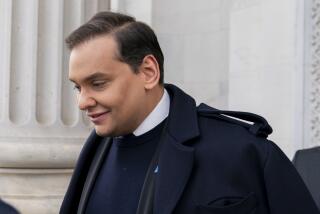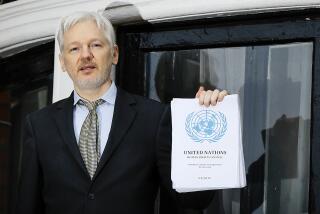Madoff’s lawyer says client will plead guilty
- Share via
Bernard L. Madoff, the alleged architect of a $50-billion Ponzi scheme whose victims included Hollywood luminaries, retirees and nonprofit charities, appears to be going down without a fight.
At a court appearance Tuesday, his lawyer said Madoff would plead guilty to 11 federal criminal charges, including fraud and money laundering.
The plea, expected Thursday, will come without a formal agreement with the U.S. attorney’s office in New York -- a move that legal experts say is intended to save his family and, perhaps, buy him some time before he goes to prison for what is likely to be the rest of his life.
Madoff, 70, faces a prison term of up to 150 years and penalties of more than $170 billion.
“This is not business as usual. You don’t expect someone who is facing 150 years and who doesn’t have that many years to live to plead guilty before he is even indicted,” said Laurie Levenson, a professor at Loyola Law School and a former assistant U.S. attorney. “He’s trying to soften his image any way he can, and the more cooperative he is, the less likely the government is to go after family members.”
Through his New York firm, Bernard L. Madoff Investment Securities, Madoff allegedly took money from new investors to pay off old ones, a scheme that worked for more than 20 years until the housing and stock markets started to tank last year.
Madoff’s attorney, Ira Sorkin, told the U.S. District Court in New York that his client intended to plead guilty.
In a statement, the U.S. attorney’s office emphasized that it had not struck a plea deal with Madoff and was aggressively pursuing the case.
“While the alleged crimes are not novel, the size and scope of Mr. Madoff’s fraud are unprecedented,” Lev L. Dassin, acting U.S. attorney for the Southern District of New York, said. “The filing of these charges does not end the matter. Our investigation is continuing.”
But former prosecutors and white-collar crime experts said Madoff would not have agreed to plead guilty without behind-the-scenes negotiations.
They said that prosecutors were stung by public outrage over Madoff’s release on bail in December and did not want to signal to the public that they were being lenient in the hope of coaxing information out of him. At the same time, prosecutors have been able to locate only about $1 billion of the lost investments. Without Madoff’s help, they are unlikely to recover much more.
“This is a public relations move by the federal government,” said Bradley Simon, a former assistant U.S. attorney who now defends white-collar crime cases in New York. “They were caught asleep at the switch, and they need him to provide a road map to where all the money went and who else was involved. They need him as much as Madoff needs them.”
Madoff, a former chairman of the Nasdaq stock market, made the plea before he was indicted, allowing the government to avoid having to present its case to a grand jury. Instead, prosecutors filed a criminal complaint Tuesday known as an information, accusing Madoff of running a sprawling financial shell game in which he took investors’ money for his personal use. Madoff’s attorneys probably saw the complaint Friday, said Steven Feldman, a New York defense attorney who has worked in the securities division for the same U.S. attorney’s office that is prosecuting Madoff.
“The defense and the prosecution definitely had conversations in advance of this document that either explained the charges entirely or the broad contours,” Feldman said.
By forgoing the grand jury, Levenson and other experts said, Madoff is ingratiating himself both to prosecutors and to the judge and building on a record of keeping himself at the center of the scheme and deflecting blame from family members or associates who may have been involved.
U.S. District Judge Denny Chin said in court that he would not sentence Madoff for several months after Thursday’s proceedings, but legal experts said Madoff could go to prison in the interim as early as Thursday to await sentencing.
Prosecutors are expected to bring witnesses to court as they argue whether Chin should accept Madoff’s plea and whether he should go to prison after the hearing.
Often in white-collar crime cases, convicted defendants remain free until sentencing, and Madoff could be building a case that he is not a flight risk, Feldman said.
“Here is a guy with untold millions. If he had wanted to run while this thing was unraveling he could have been on the next plane to Tierra del Fuego and he didn’t,” Feldman said. “That said, once he pleads guilty Thursday, the guidelines change and say that the court shall detain the defendant.”
Defense attorney Sorkin declined to comment on why Madoff was pleading guilty without a written agreement with prosecutors.
He did say that his own father had invested money with Madoff. Sorkin’s father, who died in 2001, left the money with his mother. When she died in 2007, there was $900,000 in the account, which was divided between his two sons.
“I had no direct or indirect interest in the investments, and my children had no direct or indirect interest,” Sorkin said. “Neither of my parents are around to say whether they lost money or gained money.”
--
Times staff writer Walter Hamilton in New York contributed to this report, and Associated Press was used in compiling it.
More to Read
Sign up for Essential California
The most important California stories and recommendations in your inbox every morning.
You may occasionally receive promotional content from the Los Angeles Times.










